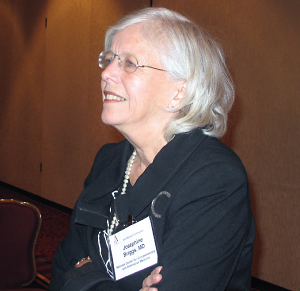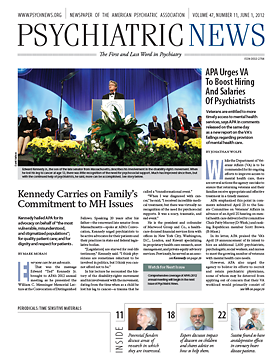For psychiatric researchers looking for grant money, especially in the domain of anxiety disorders, a session held at the annual meeting of the Anxiety Disorders Association of America in Arlington, Va., in April was likely a welcome tonic.
Key figures from government agencies, as well as from a private funding organization, reported which areas of research are of particular interest to them and which they might be more likely to fund.
For example, Philip Wang, M.D., deputy director of the National Institute of Mental Health (NIMH), reported that many pharmaceutical companies are abandoning efforts to find new and efficacious treatments for mental disorders because of clinical-trial failures and a sense that not enough is known about the underlying mechanisms of the disorders (Psychiatric News, April 6). So one of NIMH’s goals, he said, is to identify mechanisms underlying not only specific disorders, but a range of them. This approach, he hoped, will “help us get better treatment targets” than by simply focusing on individual disorders.
The National Center for Complementary and Alternative Medicine, which is only 10 years old and small compared with many of the other National Institutes of Health (NIH) institutes, has nonetheless made some interesting findings, the center’s director, Josephine Briggs, M.D., reported. For example, while studies exploring the possible effectiveness of dietary supplements such as glucosamines and fish oil have produced mixed or contradictory results, there are “some hints of benefit” with mind-body practices such as mindfulness meditation, which has been found to reduce the need for opioids in people with back pain. Consequently, her center is interested in funding studies in the mind-body domain, she indicated.
NIH is moving toward the creation of a National Institute of Substance Use and Addiction Disorders, David Shurtleff, Ph.D., acting deputy director of the National Institute on Drug Abuse (NIDA), reported. But meanwhile NIDA is alive and well, he said, and interested in funding research on a number of anxiety topics—for example, why anxiety appears to be a major cause of drug-abuse relapse.
The good news for anxiety researchers is that “there are 18 NIH institutes that fund anxiety research,” reported Ellen Stover, Ph.D., director of the Division of Mental Disorders, Behavioral Research, and AIDS at NIMH, and last year some $64 million was earmarked for anxiety research across the 18 institutes.
The good news for anxiety researchers—and for psychiatric researchers in general—comes with a dose of bad news, however, namely, that only about 8 percent of grant applications to NIH get funded, said Briggs. “It is clear to all of us that these are tough times,” she acknowledged.
Yet if anxiety and other psychiatric researchers can’t get funding from NIH, there is a nongovernmental funding institute that might fund their studies. It is the Patient-Centered Outcomes Research Institute in Washington, D.C. “We are new, and we have $120 million to commit to research in 2012,” Joseph Selby, M.D., executive director of the institute, reported. Moreover, “we are interested in [funding] compelling research across the spectrum,” including psychiatric disorders. A requirement, however, is that the research has to be patient-focused.
Still another potential funding source for psychiatric researchers, especially those researching anxiety disorders, is the Agency for Health-care Research and Quality (AHRQ), the agency’s director Carolyn Clancy, M.D., pointed out. The focus of AHRQ, which is a division of the Department of Health and Human Services, is on improving health care, she explained, and it often funds research that looks at how health care is organized and its impact on patient outcomes. She and colleagues are also interested in funding research that involves integrating primary care doctors with those providing behavioral health services. And while they have funded a lot of research concerning depression, they haven’t funded much concerning anxiety. So they would like to hear more from anxiety researchers, she said.


